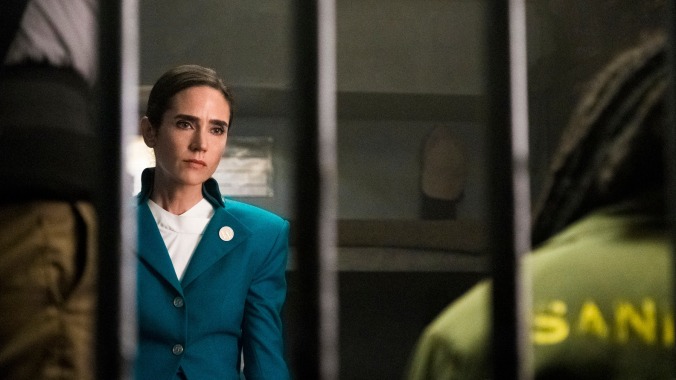And a big part of that is because the show is kind of trying to be too many things at once. A big part of the appeal of sci-fi and genre television for me is the ability to do several things at once, using allegory to heighten, enliven, and interrogate. In “Prepare To Brace,” Snowpiercer tackles the murder mystery, throws in a romance, and still has the overarching class warfare conceit to contend with, but it struggles to make those things all work together well. The results are disjointed and also crowd out character development.
The ever-cool Melanie, for example, fondly touches a photo of her with a baby, something we’re supposed to mentally store away when it inevitably becomes relevant, something to tease that there’s more to her life than being the even-keeled head of hospitality. It’s all we get for now, and meanwhile one of her choices—to stay at the current speed rather than slow down for safety—has huge consequences for the entire train and the plot, and yet we don’t really get much by way of an explanation for why she makes that call. The engineers make some comment about her being this way for the past seven years, but that hardly helps flesh out Melanie’s motives or why she decides risking an avalanche is worth it just so that there aren’t power outages aboard. And devoid of any real context or motive, it’s tough to actually be invested in these choices and consequences.
This is no fault of the actors to be sure. The acting is one of the show’s biggest strengths, and Jennifer Connelly is a compelling force even if the writing is a little too mysterious in terms of her character. Alison Wright is also giving a fantastic performance as the comparatively more ruthless Ruth, but it also feels out of place. Ruth is absolutely a familiar sci-fi villain. She’s practically giddy to freeze and smash a woman’s arm in the Tail as punishment for the rebellion. Her fur coat that she dons when visiting the cold, dark Tail is already an indelible threatening image. But the camp of this character also feels out-of-place. She’s more Hunger Games than the rest of the show is. Again, Snowpiercer hasn’t quite melded all of its parts into something cohesive. It’s overly self-serious at moments, campy at others, whiplashing between the two. And a lot of that could be mitigated by—you guessed it!—stronger character development.
In terms of the romance, Layton reconnects with his ex Zarah. And by reconnect, I mean there’s a whole sex montage! Layton’s trip to the Night Car—which is essentially a dark-lit cabaret that also serves as a grieving space—results in him flashing all the way back to life before the Snowpiercer. He and Zarah were in love, and he even proposed to her over naked donuts, but she had hesitations about the formal commitment. Now, they’ve been ripped apart by whatever made Zarah abandon the Tail for third class, but any fraughtness between them dissipates the second Layton flashes back. They have sex in the present, spliced with flashbacks to sex in their before life, when the sun could still touch their bodies as they entwined. But here’s a prime example of Snowpiercer not really making the most of its narrative. This sex montage ends up being…little more than a sex montage. We get very little character development of Zarah, and the choice to hook up with her doesn’t even tell us much about our protagonist Layton either. The emotional stakes don’t really get dealt with, because then we’re suddenly back to solving the murder, which has a cannibalism twist to it now.
Plenty of television gets off on being withholding, and I absolutely count myself a fan of “slow” television. I don’t think Snowpiercer needs to show its whole hand right out the gate, but there’s a difference between cultivating suspense and mystery and just not doing enough of the heavy-lifting up front to make its characters fully realized and compelling. The plot developments that happen in this episode do touch all the characters in some way: A resource shortage is bound to have implications for everyone, affecting the Tail worst of all. But it’s harder to be invested in those implications when the characters still feel a little too flat, a little too much like players in the game Snowpiercer is playing. That’s the tricky part of pulling off high-concept television. The characters have to stick, have to be compelling on their own outside of just the context of the concept itself. Snowpiercer isn’t quite there yet, although there are hints at more beneath its steely surface. Its parts are intermittently compelling, but they’re not all fitting together seamlessly.
Stray observations
- I once again am thinking about The 100, because in the early seasons of that show, there were a lot of different tones going on and yet it worked? The show’s camp and its darkness worked together instead of feeling like interruptions of one another. I hope Snowpiercer gets a little more like that as it steamrolls along.
- Susan Park is great, and I really wish her character had more going on!
- The dialogue on this show isn’t wholly bad, but there are occasionally some cringe moments, like Melanie saying “easy, girl” about the rattling train. Like, we get it. The train is all that she has.
- The Night Car looks like every recent iteration of “queer nightlife” on television lately.









































